Medical Device MRI Safety Testing
Where should a hip implant be placed in an ASTM F2182 test to measure the maximum RF-induced heating?
As mentioned in our previous case study , testing the radio-frequency-induced tissue heating by implanted medical devices is important to prevent harm to patients during MR imaging. The ASTM F2182 standard describes the method for testing to evaluate MRI safety with respect to RF-induced heating. The ASTM standard defines a phantom for testing (i.e., rectangular acrylic container filled with conductive gel) that acts as an approximate simulation of the human body. However, many devices have asymmetrical or complex shapes (e.g., hip implants) that present a challenge for the safety test engineer:
- Where and in what orientation should the device be placed within the ASTM F2182 phantom for adequate safety assessment?
- Where on the implant should the temperature probes be placed?

The location of the implant’s placement in the phantom also affects RF-induced heating as shown by the highly non-uniform electrical field magnitude in the ASTM F2182 phantom (see figures at right). In most cases, physical testing to determine the worst case orientation and location within the phantom as well as the location of the temperature probes would require significant effort.
Computational simulation is a  cost effective way of determining the worst case orientation and placement of the implant within the phantom. Using the computational simulation predictions, locations may be selected to place temperature probes for the physical tests.
cost effective way of determining the worst case orientation and placement of the implant within the phantom. Using the computational simulation predictions, locations may be selected to place temperature probes for the physical tests.
See an animation of a computational simulation of an example hip implant that is positioned in the worst case location and orientation within the ASTM F2182 phantom below. From the results of this cost effective simulation, MRI safety device testing may be performed with the implant in the worst case location and the temperature probes placed to identify the locations of maximum heating.
For more information about our MRI Safety Services and how we can partner with you, please contact us today 855.463.1633 | askmed@medinstitute.com | medinstitute.com.
Get email about news, services, and events from MED Institute.
OUR COMMITMENT
We are committed to consistently performing services with high quality, that deliver exceptional results, and add value to the client’s business.
For client surveys sent since 2024, we received ratings of 4.99/5 (16).
